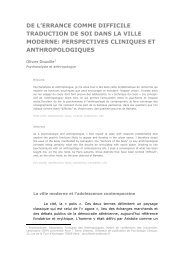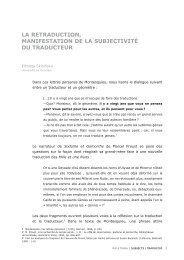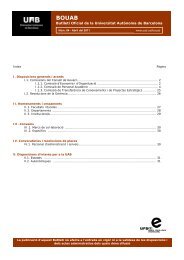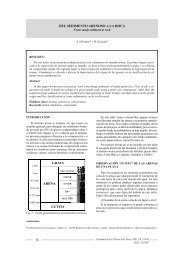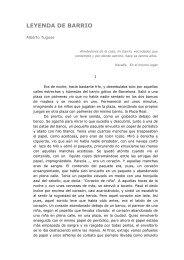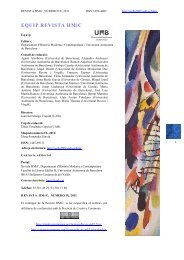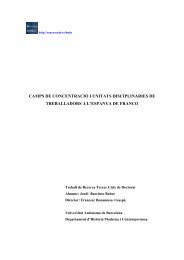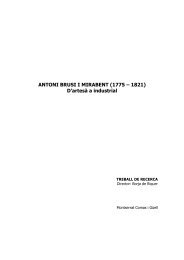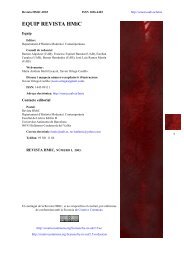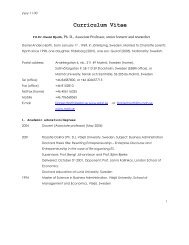- Page 1 and 2: REVISTA HMIC, NÚMERO IV, 2006 ISSN
- Page 3 and 4: REVISTA HMIC, NÚMERO IV, 2006 ISSN
- Page 5 and 6: ORIENTATS-2006 ISSN 1696-4403 http:
- Page 7 and 8: ORIENTATS-2006 ISSN 1696-4403 Seán
- Page 9 and 10: ORIENTATS-2006 ISSN 1696-4403 Seán
- Page 11 and 12: ORIENTATS-2006 ISSN 1696-4403 Seán
- Page 13 and 14: ORIENTATS-2006 ISSN 1696-4403 Seán
- Page 15 and 16: ORIENTATS-2006 ISSN 1696-4403 Seán
- Page 17: ORIENTATS-2006 ISSN 1696-4403 Seán
- Page 21 and 22: ORIENTATS-2006 ISSN 1696-4403 Seán
- Page 23 and 24: ORIENTATS-2006 ISSN 1696-4403 Joaqu
- Page 25 and 26: ORIENTATS-2006 ISSN 1696-4403 Joaqu
- Page 27 and 28: ORIENTATS-2006 ISSN 1696-4403 Joaqu
- Page 29 and 30: ORIENTATS-2006 ISSN 1696-4403 Joaqu
- Page 31 and 32: ORIENTATS-2006 ISSN 1696-4403 Joaqu
- Page 33 and 34: ORIENTATS-2006 ISSN 1696-4403 Joaqu
- Page 35 and 36: ORIENTATS-2006 ISSN 1696-4403 Joaqu
- Page 37 and 38: ORIENTATS-2006 ISSN 1696-4403 Joaqu
- Page 39 and 40: ORIENTATS-2006 ISSN 1696-4403 Joaqu
- Page 41 and 42: ORIENTATS-2006 ISSN 1696-4403 Carle
- Page 43 and 44: ORIENTATS-2006 ISSN 1696-4403 Carle
- Page 45 and 46: ORIENTATS-2006 ISSN 1696-4403 Carle
- Page 47 and 48: ORIENTATS-2006 ISSN 1696-4403 Carle
- Page 49 and 50: ORIENTATS-2006 ISSN 1696-4403 Carle
- Page 51 and 52: ORIENTATS-2006 ISSN 1696-4403 Carle
- Page 53 and 54: ORIENTATS-2006 ISSN 1696-4403 Carle
- Page 55 and 56: ORIENTATS-2006 ISSN 1696-4403 Jordi
- Page 57 and 58: ORIENTATS-2006 ISSN 1696-4403 Jordi
- Page 59 and 60: ORIENTATS-2006 ISSN 1696-4403 Jordi
- Page 61 and 62: ORIENTATS-2006 ISSN 1696-4403 Jordi
- Page 63 and 64: ORIENTATS-2006 ISSN 1696-4403 Jordi
- Page 65 and 66: ORIENTATS-2006 ISSN 1696-4403 Jordi
- Page 67 and 68: ORIENTATS-2006 ISSN 1696-4403 Jordi
- Page 69 and 70:
ORIENTATS-2006 ISSN 1696-4403 Jordi
- Page 71 and 72:
ORIENTATS-2006 ISSN 1696-4403 Jordi
- Page 73 and 74:
ORIENTATS-2006 ISSN 1696-4403 Jordi
- Page 75 and 76:
ORIENTATS-2006 ISSN 1696-4403 Manue
- Page 77 and 78:
ORIENTATS-2006 ISSN 1696-4403 Manue
- Page 79 and 80:
ORIENTATS-2006 ISSN 1696-4403 Manue
- Page 81 and 82:
ORIENTATS-2006 ISSN 1696-4403 Manue
- Page 83 and 84:
ORIENTATS-2006 ISSN 1696-4403 Manue
- Page 85 and 86:
ORIENTATS-2006 ISSN 1696-4403 Manue
- Page 87 and 88:
ORIENTATS-2006 ISSN 1696-4403 Manue
- Page 89 and 90:
ORIENTATS-2006 ISSN 1696-4403 Manue
- Page 91 and 92:
ORIENTATS-2006 ISSN 1696-4403 Manue
- Page 93 and 94:
ORIENTATS-2006 ISSN 1696-4403 Manue
- Page 95 and 96:
ORIENTATS-2006 ISSN 1696-4403 Manue
- Page 97 and 98:
ORIENTATS-2006 ISSN 1696-4403 Jorge
- Page 99 and 100:
ORIENTATS-2006 ISSN 1696-4403 Jorge
- Page 101 and 102:
ORIENTATS-2006 ISSN 1696-4403 Jorge
- Page 103 and 104:
ORIENTATS-2006 ISSN 1696-4403 Jorge
- Page 105 and 106:
ORIENTATS-2006 ISSN 1696-4403 Jorge
- Page 107 and 108:
ORIENTATS-2006 ISSN 1696-4403 Jorge
- Page 109 and 110:
ORIENTATS-2006 ISSN 1696-4403 Jorge
- Page 111 and 112:
ORIENTATS-2006 ISSN 1696-4403 Jorge
- Page 113 and 114:
ORIENTATS-2006 ISSN 1696-4403 Juan
- Page 115 and 116:
ORIENTATS-2006 ISSN 1696-4403 Juan
- Page 117 and 118:
ORIENTATS-2006 ISSN 1696-4403 Juan
- Page 119 and 120:
ORIENTATS-2006 ISSN 1696-4403 Juan
- Page 121 and 122:
ORIENTATS-2006 ISSN 1696-4403 Juan
- Page 123 and 124:
ORIENTATS-2006 ISSN 1696-4403 Juan
- Page 125 and 126:
ORIENTATS-2006 ISSN 1696-4403 Josef
- Page 127 and 128:
ORIENTATS-2006 ISSN 1696-4403 Josef
- Page 129 and 130:
ORIENTATS-2006 ISSN 1696-4403 Josef
- Page 131 and 132:
ORIENTATS-2006 ISSN 1696-4403 Josef
- Page 133 and 134:
ORIENTATS-2006 ISSN 1696-4403 Josef
- Page 135 and 136:
ORIENTATS-2006 ISSN 1696-4403 Josef
- Page 137 and 138:
ORIENTATS-2006 ISSN 1696-4403 Hea-J
- Page 139 and 140:
ORIENTATS-2006 ISSN 1696-4403 Hea-J
- Page 141 and 142:
ORIENTATS-2006 ISSN 1696-4403 Hea-J
- Page 143 and 144:
ORIENTATS-2006 ISSN 1696-4403 Hea-J
- Page 145 and 146:
ORIENTATS-2006 ISSN 1696-4403 Hea-J
- Page 147 and 148:
ORIENTATS-2006 ISSN 1696-4403 Hea-J
- Page 149 and 150:
ORIENTATS-2006 ISSN 1696-4403 Hea-J
- Page 151 and 152:
ORIENTATS-2006 ISSN 1696-4403 Marta
- Page 153 and 154:
ORIENTATS-2006 ISSN 1696-4403 Marta
- Page 155 and 156:
ORIENTATS-2006 ISSN 1696-4403 Marta
- Page 157 and 158:
ORIENTATS-2006 ISSN 1696-4403 Marta
- Page 159 and 160:
ORIENTATS-2006 ISSN 1696-4403 Marta
- Page 161 and 162:
ORIENTATS-2006 ISSN 1696-4403 Marta
- Page 163 and 164:
ORIENTATS-2006 ISSN 1696-4403 Marta
- Page 165 and 166:
ORIENTATS-2006 ISSN 1696-4403 Marta
- Page 167 and 168:
ORIENTATS-2006 ISSN 1696-4403 Marta
- Page 169 and 170:
ORIENTATS-2006 ISSN 1696-4403 Marta
- Page 171 and 172:
ORIENTATS-2006 ISSN 1696-4403 Marta
- Page 173 and 174:
ORIENTATS-2006 ISSN 1696-4403 Marta
- Page 175 and 176:
ORIENTATS-2006 ISSN 1696-4403 Marta
- Page 177 and 178:
ORIENTATS-2006 ISSN 1696-4403 Marta
- Page 179 and 180:
ORIENTATS-2006 ISSN 1696-4403 Marta
- Page 181 and 182:
ORIENTATS-2006 ISSN 1696-4403 Marta
- Page 183 and 184:
ORIENTATS-2006 ISSN 1696-4403 Marta
- Page 185 and 186:
ORIENTATS-2006 ISSN 1696-4403 Marta
- Page 187 and 188:
ORIENTATS-2006 ISSN 1696-4403 Marta
- Page 189 and 190:
ORIENTATS-2006 ISSN 1696-4403 Anna
- Page 191 and 192:
ORIENTATS-2006 ISSN 1696-4403 Anna
- Page 193 and 194:
ORIENTATS-2006 ISSN 1696-4403 Anna
- Page 195 and 196:
ORIENTATS-2006 ISSN 1696-4403 Anna
- Page 197 and 198:
ORIENTATS-2006 ISSN 1696-4403 Anna
- Page 199 and 200:
ORIENTATS-2006 ISSN 1696-4403 Anna
- Page 201 and 202:
ORIENTATS-2006 ISSN 1696-4403 Manel
- Page 203 and 204:
ORIENTATS-2006 ISSN 1696-4403 Manel
- Page 205 and 206:
ORIENTATS-2006 ISSN 1696-4403 Manel
- Page 207 and 208:
ORIENTATS-2006 ISSN 1696-4403 Manel
- Page 209 and 210:
ORIENTATS-2006 ISSN 1696-4403 Manel
- Page 211 and 212:
MISCEL·LÀNIA-2006 ISSN 1696-4403
- Page 213 and 214:
MISCEL·LÀNIA-2006 ISSN 1696-4403
- Page 215 and 216:
MISCEL·LÀNIA-2006 ISSN 1696-4403
- Page 217 and 218:
MISCEL·LÀNIA-2006 ISSN 1696-4403
- Page 219 and 220:
MISCEL·LÀNIA-2006 ISSN 1696-4403
- Page 221 and 222:
MISCEL·LÀNIA-2006 ISSN 1696-4403
- Page 223 and 224:
MISCEL·LÀNIA-2006 ISSN 1696-4403
- Page 225 and 226:
MISCEL·LÀNIA-2006 ISSN 1696-4403
- Page 227 and 228:
MISCEL·LÀNIA-2006 ISSN 1696-4403
- Page 229 and 230:
MISCEL·LÀNIA-2006 ISSN 1696-4403
- Page 231 and 232:
MISCEL·LÀNIA-2006 ISSN 1696-4403
- Page 233 and 234:
MISCEL·LÀNIA-2006 ISSN 1696-4403
- Page 235 and 236:
MISCEL·LÀNIA-2006 ISSN 1696-4403
- Page 237 and 238:
MISCEL·LÀNIA-2006 ISSN 1696-4403
- Page 239 and 240:
MISCEL·LÀNIA-2006 ISSN 1696-4403
- Page 241 and 242:
MISCEL·LÀNIA-2006 ISSN 1696-4403
- Page 243 and 244:
MISCEL·LÀNIA-2006 ISSN 1696-4403
- Page 245 and 246:
MISCEL·LÀNIA-2006 ISSN 1696-4403
- Page 247 and 248:
MISCEL·LÀNIA-2006 ISSN 1696-4403
- Page 249 and 250:
MISCEL·LÀNIA-2006 ISSN 1696-4403
- Page 251 and 252:
MISCEL·LÀNIA-2006 ISSN 1696-4403
- Page 253 and 254:
MISCEL·LÀNIA-2006 ISSN 1696-4403
- Page 255 and 256:
MISCEL·LÀNIA-2006 ISSN 1696-4403
- Page 257 and 258:
MISCEL·LÀNIA-2006 ISSN 1696-4403
- Page 259 and 260:
MISCEL·LÀNIA-2006 ISSN 1696-4403
- Page 261 and 262:
MISCEL·LÀNIA-2006 ISSN 1696-4403
- Page 263 and 264:
MISCEL·LÀNIA-2006 ISSN 1696-4403
- Page 265 and 266:
MISCEL·LÀNIA-2006 ISSN 1696-4403
- Page 267 and 268:
MISCEL·LÀNIA-2006 ISSN 1696-4403
- Page 269 and 270:
MISCEL·LÀNIA-2006 ISSN 1696-4403
- Page 271 and 272:
MISCEL·LÀNIA-2006 ISSN 1696-4403
- Page 273 and 274:
MISCEL·LÀNIA-2006 ISSN 1696-4403
- Page 275 and 276:
MISCEL·LÀNIA-2006 ISSN 1696-4403
- Page 277 and 278:
MISCEL·LÀNIA-2006 ISSN 1696-4403
- Page 279 and 280:
MISCEL·LÀNIA-2006 ISSN 1696-4403
- Page 281 and 282:
MISCEL·LÀNIA-2006 ISSN 1696-4403
- Page 283 and 284:
MISCEL·LÀNIA-2006 ISSN 1696-4403
- Page 285 and 286:
MISCEL·LÀNIA-2006 ISSN 1696-4403
- Page 287 and 288:
MISCEL·LÀNIA-2006 ISSN 1696-4403
- Page 289 and 290:
MISCEL·LÀNIA-2006 ISSN 1696-4403
- Page 291 and 292:
MISCEL·LÀNIA-2006 ISSN 1696-4403
- Page 293 and 294:
MISCEL·LÀNIA-2006 ISSN 1696-4403
- Page 295 and 296:
MISCEL·LÀNIA-2006 ISSN 1696-4403
- Page 297 and 298:
MISCEL·LÀNIA-2006 ISSN 1696-4403
- Page 299 and 300:
MISCEL·LÀNIA-2006 ISSN 1696-4403
- Page 301 and 302:
DEBATS-2006 ISSN 1696-4403 Vladimir
- Page 303 and 304:
DEBATS-2006 ISSN 1696-4403 Vladimir
- Page 305 and 306:
DEBATS-2006 ISSN 1696-4403 Vladimir
- Page 307 and 308:
DEBATS-2006 ISSN 1696-4403 Vladimir
- Page 309 and 310:
DEBATS-2006 ISSN 1696-4403 Vladimir
- Page 311 and 312:
DEBATS-2006 ISSN 1696-4403 CINDOC A
- Page 313 and 314:
DEBATS-2006 ISSN 1696-4403 CINDOC 5
- Page 315 and 316:
DEBATS-2006 ISSN 1696-4403 CINDOC 2
- Page 317 and 318:
DEBATS-2006 ISSN 1696-4403 Claudio
- Page 319 and 320:
DEBATS-2006 ISSN 1696-4403 Claudio
- Page 321 and 322:
DEBATS-2006 ISSN 1696-4403 Claudio
- Page 323 and 324:
RESSENYES-2006 ISSN 1696-4403 Gerar
- Page 325 and 326:
RESSENYES-2006 ISSN 1696-4403 Laura
- Page 327 and 328:
RESSENYES-2006 ISSN 1696-4403 Monts
- Page 329 and 330:
RESSENYES-2006 ISSN 1696-4403 Jaime
- Page 331 and 332:
RESSENYES-2006 ISSN 1696-4403 Luis
- Page 333 and 334:
RESSENYES-2006 ISSN 1696-4403 Inmac
- Page 335 and 336:
RESSENYES-2006 ISSN 1696-4403 Joan-
- Page 337 and 338:
RESSENYES-2006 ISSN 1696-4403 Joan-
- Page 339 and 340:
RESSENYES-2006 ISSN 1696-4403 M. Ll
- Page 341 and 342:
RESSENYES-2006 ISSN 1696-4403 Kaori
- Page 343 and 344:
RESSENYES-2006 ISSN 1696-4403 Kaori
- Page 345 and 346:
RESSENYES-2006 ISSN 1696-4403 Artur
- Page 347 and 348:
RESSENYES-2006 ISSN 1696-4403 Artur
- Page 349 and 350:
RESSENYES-2006 ISSN 1696-4403 M. Ll
- Page 351 and 352:
PUBLICACIONS-2006 ISSN 1696-4403 Re
- Page 353 and 354:
PUBLICACIONS-2006 ISSN 1696-4403 Re



